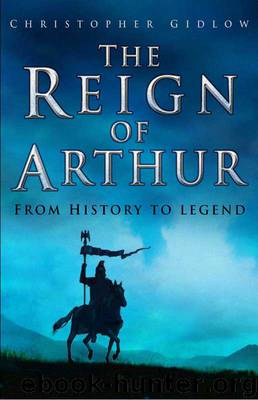The Reign of Arthur by Christopher Gidlow

Author:Christopher Gidlow
Language: eng
Format: epub
ISBN: 9780752495156
Publisher: The History Press
King Arthur?
The combination of sources so far has yielded several plausible roles for Arthur, the victor of Badon Hill. He could be a sub-king of Ercing, of lesser rank to the main kings, but giving him access to his own warband and lands. This would make sense of his South Welsh connections. He equally could be the over-king of one of the civitates, Trinovantes, Dubonni, Durotriges or Brigantes, which did not yield lasting British dynasties. All these are in the war-zone and could provide us with a ‘King Arthur’. He could even be a great king, with power over several British kings, as medieval legends imagined him.
Other analysis has suggested that Arthur was a military figure, perhaps even of non-British origin, employed as Magister Militum by a dominant civitas king or, much more likely, by a coordinating authority such as a successor provincial or diocesan ruler. His power would therefore be different in origin to that of the civitas kings. That may, however, create a false impression of the extent of his power. Dark Age experience shows that the controller of the soldiers could soon become the power behind the throne, or even the one sitting on it. There was usually only a thin line between what constituted a Magister Militum and the ‘ruler of a kingdom’.
I have specifically avoided phrasing these as contradictory alternatives. Alcock used the analogy of Wellington and Arthur, arguing that Wellington and Waterloo are so strongly linked that the commander’s name would be assumed in any reference to his victory. We might say that, if detailed knowledge were lost, it would be difficult to judge Wellington’s status. We could find sources to show he was an Irish soldier, an Indian general, an English duke, a Spanish grandee, a British field marshal and the prime minister of the United Kingdom. The reality is that these are not conflicting possibilities but changing roles during a successful military and political career.
There is no reason why Arthur should not have been a non-royal, perhaps non-British, military figure who came to rule a British kingdom or sub-kingdom while also being the Magister Militum for civil authorities. One would expect that, even if a successful Dark Age general started in subordinate or non-royal role, victory would pretty soon be translated into civil power. The Historia’s battle-list might read as a progression showing how Dux Arthur, fighting with the kings of the Britons, comes to a final victory when he alone now has the power to turn back the Saxons.
Download
This site does not store any files on its server. We only index and link to content provided by other sites. Please contact the content providers to delete copyright contents if any and email us, we'll remove relevant links or contents immediately.
| Belgium | France |
| Germany | Great Britain |
| Greenland | Italy |
| Netherlands | Romania |
| Scandinavia |
Room 212 by Kate Stewart(5102)
The Crown by Robert Lacey(4802)
Endurance: Shackleton's Incredible Voyage by Alfred Lansing(4752)
The Iron Duke by The Iron Duke(4348)
The Rape of Nanking by Iris Chang(4199)
Joan of Arc by Mary Gordon(4093)
Killing England by Bill O'Reilly(3991)
Say Nothing by Patrick Radden Keefe(3974)
I'll Give You the Sun by Jandy Nelson(3424)
Shadow of Night by Deborah Harkness(3354)
Hitler's Monsters by Eric Kurlander(3327)
Mary, Queen of Scots, and the Murder of Lord Darnley by Alison Weir(3194)
Blood and Sand by Alex Von Tunzelmann(3191)
Eleanor & Park by Rainbow Rowell(3148)
Darkest Hour by Anthony McCarten(3117)
Margaret Thatcher: The Autobiography by Thatcher Margaret(3072)
Book of Life by Deborah Harkness(2921)
Red Famine: Stalin's War on Ukraine by Anne Applebaum(2917)
The One Memory of Flora Banks by Emily Barr(2853)
